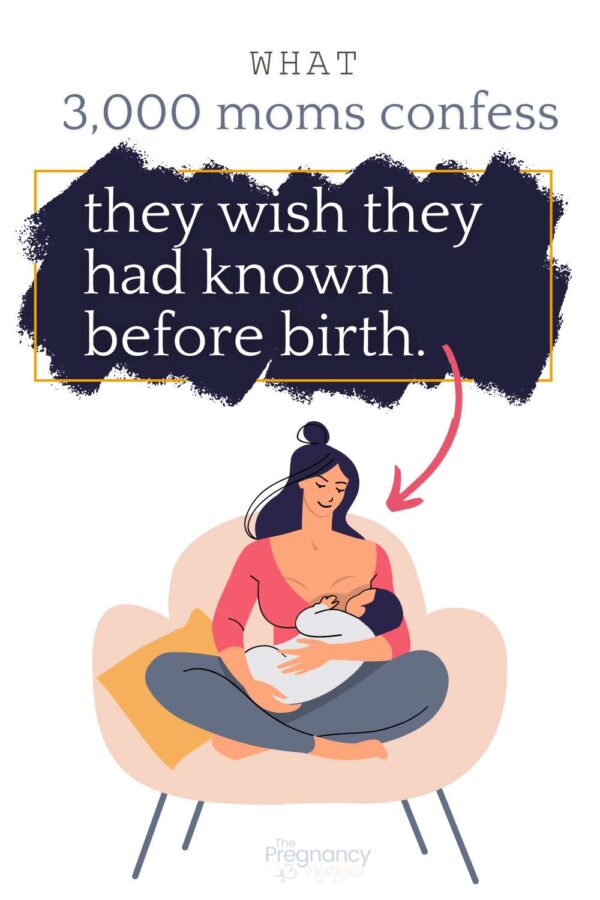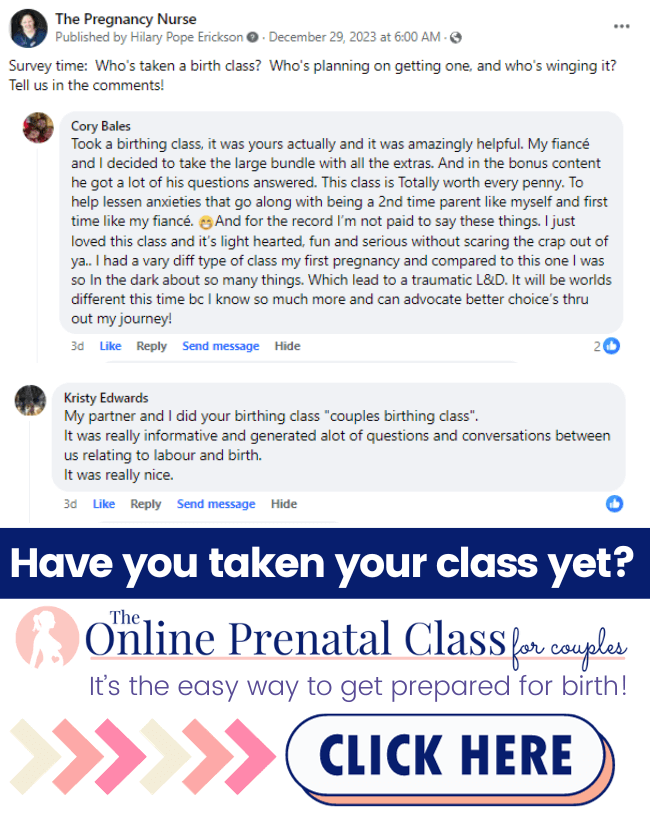👋 I’m so glad YOU are here. Are you looking to also get your partner prepared? This is for BOTH of you. Couples just love it and I know you want to both feel prepared!
Today we’re going to deep dive into a study on what parents (especially first time parents) wish they had known about before birth. The fact is that often parents have regrets that they were more prepared before going into labor room — so if you (who is likely still pregnant) can learn about these things, you’ll be a step ahead, right? So, let’s get you prepared.
I’m taking this article from a study out of Pennsylvania in the US that interviewed 3006 one month after their first time giving birth.
The study is here. It is in the August, 2024 issue of Birth Issues in Prenatal Care.

Let me share the initial findings:
A total of 441 women (14.7%) reported there was something they would like to have known before their first childbirth. Women described that communication with care providers was their main concern. They would have liked a better understanding of their options before birth, more agency in decision-making, and more information about the topics of their body, their birth, their baby, and what to expect beyond birth.
So, how can YOU make a difference in your birth? Let’s talk about it….
Quick Skim Notes — I recommend this class that covers all the things they mention in the study, it really is your one-stop-shop birth prep!
Communicating With Your Provider
As a mom, with young adult children I know how hard it is for them to call and make an appointment, little LONE actually speak to them about an actual problem. If you feel nervous talking to your provider I have a few tips for you:
- Remember they’re just a person. Doctors are quirky, fun people just like the rest of us and there is no reason to be nervous to talk to them. They just went to a LOT of school.
- You are paying them a LOT of money. They should be listening to you. Sometimes insurance takes this bit out of our hands, but really you need to get your money’s worth.
- They often won’t volunteer information as some patients don’t want that, so feel free to ask more questions!
In fact, even 2021 I realized this was such an issue I created a provider communication bonus video in my prenatal class where I roleplay scenarios in talking with providers to make it easier for you.
Honestly, no shame in role-playing asking your provider questions with a friend. We only get good at doing things by practicing them. It may seem silly or goofy, but will be WELL worth it if you end up having a great delivery because of it!
There is NO reason to be embarrassed about talking with your provider, and I encourage you to speak up more in prenatal appointments and get your questions answered early so you’re used to it! Providers EXPECT questions (and can’t read your mind).
Options During Delivery
Women wished they knew more options during delivery. Which makes total sense.
Often providers only mention what they think is best, rather than going through your options.
However, you can ALWAYS Ask — good questions to ask are:
- Is there anything else we can do instead?
- What if we waited? Is that bad right now?
- Are there other medications we can try? (obviously if you’re talking medications)
Often those are ones that get the conversation started and then you can go from there.
Honestly, taking a class that goes over most of your options is your best bet here.
Providers just don’t have time to go over all the options in labor during prenatal appointments, and often when they do in labor patients find that they’re overwhelmed and just not sure what to do.
Learning things in advance is SO important in these tense situations like birth.
I think doing a birth plan is a great start (grab my tips right here):
But, I really recommend a full class to get prepared for your options — and knowing them in advance as you take the class in your third trimester is going to be SO helpful!
What Will Happen to My Body?
- How an induction will feel
- What will happen to me in a cesarean
- Do I have to deliver on my back?
Women today have a lot of bodily autonomy, and they expect that to extend into the medical sphere. And, sadly, the medical community isn’t always great at that.
Again, the more questions you can ask about what is going on with you and YOUR situation can be so helpful. Especially with inductions. MANY people are caught off-guard by how long and almost annoying they are — which is why I have this induction questionnaire for you:
In reading the study it was a lot of what happens to your body during a cesarean or directly at birth though. Especially during surgery we do have to position, and do things to make safety for both you and your team a priority.
People love that in my class I go over….
- How the room will feel
- What you’ll hear
- What’s going to go on after they make you numb (you’ll see it, but likely won’t feel most of it).
Just gives them a sense of control over something that seems so very out of control. I don’t do it just for cesareans, but because that is so foreign to most people it’s a good example for you.
What happens at birth?
Birth can feel very traumatic if you don’t know what’s going on. Information on how an induction happens, if you were to tear (or be cut) — what that all looks like and what types of choices you have.
Let me be very clear that modern media has not done us any favors in what birth will look like. You’re often filled with fantasies and when reality hits, it often brings trauma with it — so don’t look to media to fill it for you.
Just like I talked about with a cesarean knowing things like:
- Baby will be very goopy, and likely bloody after delivery when they put them on your chest
- How you’ll have a couple of nurses right by you to help with you and baby
- That the placenta still has to be delivered
- How you can ask for dad to hold baby if you’re feeling overwhelmed — it can be a LOT
It just helps you know what the steps are going to be — you don’t feel like you’re in an unfamiliar country. That’s why a birth class can really be a game changer.
They Want Predictability
I think with the “advancement of science” women think we know more than we actually do. They think we know when babies will be born, and how birth will go based on their history.
I was sort of amused (but also sad) when I read this, I think we do give a sense of we “know” what’s going to happen — but in reality we all have no idea. It’s why it makes the L&D unit a fun (and sometimes scary) place to work.
The reality is that you can know about the stages of labor (I have a bonus video on that in here) that are pretty predictive of what your body will go through, but as far as timing and other things…. we just don’t know til’ it happens!
Letting go of the myth of control is one of the things I think you have to let go of before going to have your baby. Getting prepared, oddly, can somehow help make that easier!
One of the hardest things about working in the birth field is that we have to let you know the risks (like having a big baby) without actually knowing if it is a problem. That’s why they call it practicing medicine… unfortunately.

What happens AFTER birth?
Things like breastfeeding, or that some babies have to go to the NICU caught moms off-guard.
They also highlighted postpartum pain and how they weren’t prepared for it either.
Honestly, this was a huge issue for myself. I took a hospital-based class with my first baby and I wasn’t prepared at ALL for what life held after baby was born.
Some birth classes still seem to want to keep that all a secret, but I couldn’t be more different — I have 2 full chapters on life after baby is born to help you get prepared and stay safe when baby is home.
Oh, and did I mention my bundle class actually even includes breastfeeding? Yeah, I think of all the things. 🙂
What should childbirth education focus on?
The study highlighted a few things that childbirth education should include:
1. Normal physiology of pregnancy and childbirth.
2. Managing normal birth with a variety of pharmacological and non-pharmacological methods, which are included and demonstrated during classes, to support labour.
3. Explanation of common interventions and expectations of hospital care, risks and benefits, and evidence-based care.
4. Shared decision-making—care options and hospital procedures (autonomy).
5. Promotion of initiation and duration of breastfeeding to enhance bonding and normal physiological processes for the postnatal period.
6. Postnatal—caring for baby and me, and strengthening social support among participants for postnatal support.
And honestly, I am so proud to say that as I read this study my class checks off EACH of these things. Plus, it gives you lots of outside resources if you want to know more on a particular topic too.
- Lesson #5 goes through what to expect from both your body and hospital staff as you get into active labor (I also have a phases of labor bonus video that a lot of people find helpful)
- Lesson #7 goes through the different pain management options including IV, epidural and I have a natural pain management bonus video included with all classes.
- Lesson #5 and #8 go through common interventions in labor and at delivery so you know about your options in advance.
- In every lesson I talk about informed consent, shared decision making and how you can take charge of your own birth in relation to whatever we’re talking about.
- I have a bonus video on breastfeeding done by one of my trusted IBCLC friends.
- In Lessons #11 and #12 I talk about how to heal best, how to stay healthy and integrate your baby & village into your healing process
I truly believe The Online Prenatal Class for Couples is the most complete birth class out there. I want to price it so any couple can afford it (including split payments), and I try to make it as easy as possible to do (so that you actually DO it). The main basics really take just 3 hours — and is done in less than 20 minute chunks that are easily absorbed.
SO many people think that they can cover these topics on their own through articles, social media or in talking with friends. But I have to say, invest in a class that will cover it beginning to end to get you prepared today. I promise it costs less than you think (payment plans available).
Want to do a vibe check before diving into the whole thing with me? — check out my free labor pro tips. It’s your first step toward getting in the driver’s seat of your birth.












 Advocating For Yourself in Labor
Advocating For Yourself in Labor
